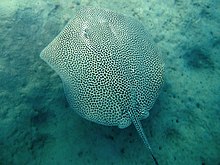Himantura is a genus of stingray in the family Dasyatidae that is native to the Indo-Pacific. In a 2016 taxonomic revision, many of the species formerly assigned to Himantura were reassigned to other genera (Brevitrygon, Fluvitrygon, Maculabatis, Pateobatis, Styracura and Urogymnus).[2]
| Himantura | |
|---|---|

| |
| Reticulate whipray (Himantura uarnak) | |
| Scientific classification | |
| Domain: | Eukaryota |
| Kingdom: | Animalia |
| Phylum: | Chordata |
| Class: | Chondrichthyes |
| Subclass: | Elasmobranchii |
| Order: | Myliobatiformes |
| Family: | Dasyatidae |
| Subfamily: | Urogymninae |
| Genus: | Himantura J. P. Müller & Henle, 1837 |
| Type species | |
| Raja sephen uarnak J. F. Gmelin, 1789
| |
Species
editTwelve extant species are currently recognized as valid,[3][4] formerly four or five species.[5]
- Himantura alcockii (Annandale, 1909) (Pale-spot whip ray)
- Himantura australis Last, White & Naylor, 2016 (Australian whipray)
- Himantura fava (Annandale, 1909) (Honeycomb whipray)
- Himantura fluviatilis (Hamilton, 1822) (Ganges whipray)
- Himantura krempfi (Chabanaud, 1923) (Marbled freshwater whip ray)
- Himantura leoparda Manjaji-Matsumoto & Last, 2008
- Himantura marginata (Blyth, 1860) (Blackedge whipray)
- †Himantura menoni (Sahni & Mehrotra, 1981)[6]
- Himantura microphthalma (J. T. F. Chen, 1948) (Smalleye whip ray)
- Himantura pareh (Bleeker, 1852)
- †Himantura souarfortuna Adnet et al., 2020 [6]
- Himantura tutul Borsa, Durand, K. N. Shen, Arlyza, Solihin & Berrebi, 2013 (Fine-spotted leopard whipray)
- Himantura uarnak (J. F. Gmelin, 1789) (Reticulate whipray)
- Himantura undulata (Bleeker, 1852) (Leopard whipray)
The former contentious species, Himantura tutul[7] has had its validity disputed[8] and has been considered a junior synonym of H. uarnak by the Catalog of Fishes.[9] However, H. tutul was previously confused not with H. uarnak, but with H. leoparda, and subsequently shown to be genetically distinct and reproductively isolated from both H. uarnak and H. leoparda.[10][11][12] Both adult H. leoparda and H. tutul present leopard-like ocellated spots. These are smaller and less numerous in H. tutul.[7][10][11]
Synonyms
editData from: [4]
- Himantura alcocki: synonym of Himantura alcockii
- Himantura astra: synonym of Maculabatis astra
- Himantura bleekeri: synonym of Pateobatis bleekeri
- Himantura chaophraya: synonym of Urogymnus polylepis
- Himantura chaophrya: synonym of Urogymnus polylepis
- Himantura dalyensis: synonym of Urogymnus dalyensis
- Himantura draco: synonym of Pateobatis jenkinsii
- Himantura fai: synonym of Pateobatis fai
- Himantura gerrardi: synonym of Maculabatis gerrardi
- Himantura granulata: synonym of Urogymnus granulatus
- Himantura heterurus: synonym of Brevitrygon heterura
- Himantura hortlei: synonym of Pateobatis hortlei
- Himantura imbricata: synonym of Brevitrygon imbricata
- Himantura javaensis: synonym of Brevitrygon javaensis
- Himantura jenkinsii: synonym of Pateobatis jenkinsii
- Himantura lobistoma: synonym of Urogymnus lobistoma
- Himantura oxyrhyncha: synonym of Fluvitrygon oxyrhynchus
- Himantura pacifica: synonym of Styracura pacifica
- Himantura pastinacoides: synonym of Maculabatis pastinacoides
- Himantura polylepis: synonym of Urogymnus polylepis
- Himantura ponapensis: synonym of Urogymnus granulatus
- Himantura punctata: synonym of Himantura uarnak
- Himantura randalli: synonym of Maculabatis randalli
- Himantura schmardae: synonym of Styracura schmardae
- Himantura signifer: synonym of Fluvitrygon signifer
- Himantura toshi: synonym of Maculabatis toshi
- Himantura uarnacoides: synonym of Pateobatis uarnacoides
- Himantura walga: synonym of Brevitrygon walga
References
edit- ^ "†Himantura Müller and Henle 1837 (ray)". Fossilworks. Archived from the original on 2023-03-12. Retrieved 2023-07-06.
- ^ Last, P.R.; Naylor, G.J.; Manjaji-Matsumoto, B.M. (2016). "A revised classification of the family Dasyatidae (Chondrichthyes: Myliobatiformes) based on new morphological and molecular insights". Zootaxa. 4139 (3): 345–368. doi:10.11646/zootaxa.4139.3.2. PMID 27470808.
- ^ Froese, Rainer; Pauly, Daniel (eds.). "Species in genus Himantura". FishBase.
- ^ a b Bailly, Nicolas (2014). "Himantura Müller & Henle, 1837". WoRMS. World Register of Marine Species. Retrieved 2 July 2023.
- ^ Fernando, D.; Brown, R.M.K.; Tanna, A.; Gobiraj, R.; Ralicki, H.; Jockusch, E.L.; Ebert, D.A.; Jensen, K.; Caira, J.N. (2019). "New insights into the identities of the elasmobranch fauna of Sri Lanka". Zootaxa. 4585 (2): 201–238. doi:10.11646/zootaxa.4585.2.1. PMID 31716166. S2CID 146082424.
- ^ a b "Extinct - valid species | Species | Shark-References". shark-references.com. Retrieved 2023-07-06.
- ^ a b Borsa, P.; Durand, J.-D.; Shen, K.-N.; Arlyza, I.S.; Solihin, D.D.; Berrebi, P. (2013). "Himantura tutul sp. nov. (Myliobatoidae, Dasyatidae), a new ocellated whipray from the tropical Indo-West Pacific, described from its cytochrome-oxidase I gene sequence" (PDF). Comptes Rendus Biologies. 336 (2): 82–92. doi:10.1016/j.crvi.2013.01.004. PMID 23608177. S2CID 13204782.
- ^ Weigmann, S. (2016). "Annotated checklist of the living sharks, batoids and chimaeras (Chondrichthyes) of the world, with a focus on biogeographical diversity". Journal of Fish Biology. 88 (3): 837–1037. Bibcode:2016JFBio..88..837W. doi:10.1111/jfb.12874. PMID 26860638.
- ^ Eschmeyer, W.N.; R. Fricke; R. van der Laan (24 April 2018). "Catalog of Fishes". California Academy of Sciences. Retrieved 24 April 2018.
- ^ a b Arlyza, I.S.; Shen, K.-N.; Solihin, D.D.; Soedharma D.; Berrebi, P.; Borsa, P. (2013). "Species boundaries in the Himantura uarnak species complex (Myliobatiformes : Dasyatidae)" (PDF). Molecular Phylogenetics and Evolution. 66 (1): 429–435. Bibcode:2013MolPE..66..429A. doi:10.1016/j.ympev.2012.09.023. PMID 23023209. S2CID 17310045.
- ^ a b Borsa, P. (2017). "Comment on 'Annotated checklist of the living sharks, batoids and chimaeras (Chondrichthyes) of the world, with a focus on biogeographical diversity' by Weigmann (2016)" (PDF). Journal of Fish Biology. 90 (4): 1170–1175. Bibcode:2017JFBio..90.1170B. doi:10.1111/jfb.13235. PMID 28026866.
- ^ Philippe Borsa; Collin T. Williams; Ashlie J. McIvor; Thierry B. Hoareau; Michael L. Berumen (2021). "Neotype designation and re-description of Forsskål's reticulate whipray Himantura uarnak". Marine Biodiversity. 51 (2): 28. Bibcode:2021MarBd..51...28B. doi:10.1007/s12526-021-01180-1. hdl:10754/665804. S2CID 255610805.